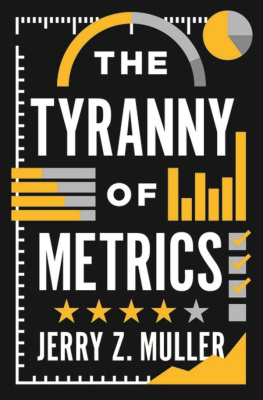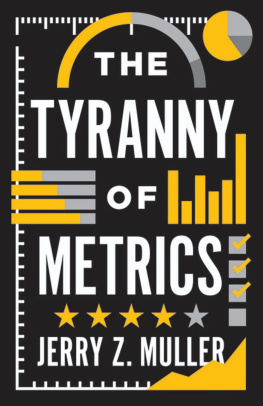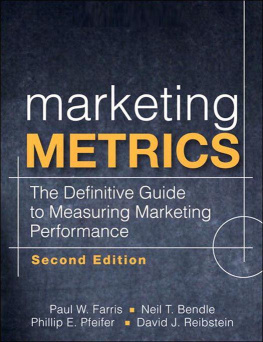Muller - The Tyranny of Metrics
Here you can read online Muller - The Tyranny of Metrics full text of the book (entire story) in english for free. Download pdf and epub, get meaning, cover and reviews about this ebook. City: Princeton, year: 2019;2018, publisher: Princeton University Press, genre: Romance novel. Description of the work, (preface) as well as reviews are available. Best literature library LitArk.com created for fans of good reading and offers a wide selection of genres:
Romance novel
Science fiction
Adventure
Detective
Science
History
Home and family
Prose
Art
Politics
Computer
Non-fiction
Religion
Business
Children
Humor
Choose a favorite category and find really read worthwhile books. Enjoy immersion in the world of imagination, feel the emotions of the characters or learn something new for yourself, make an fascinating discovery.
- Book:The Tyranny of Metrics
- Author:
- Publisher:Princeton University Press
- Genre:
- Year:2019;2018
- City:Princeton
- Rating:3 / 5
- Favourites:Add to favourites
- Your mark:
The Tyranny of Metrics: summary, description and annotation
We offer to read an annotation, description, summary or preface (depends on what the author of the book "The Tyranny of Metrics" wrote himself). If you haven't found the necessary information about the book — write in the comments, we will try to find it.
How the obsession with quantifying human performance threatens our schools, medical care, businesses, and government
Today, organizations of all kinds are ruled by the belief that the path to success is quantifying human performance, publicizing the results, and dividing up the rewards based on the numbers. But in our zeal to instill the evaluation process with scientific rigor, weve gone from measuring performance to fixating on measuring itself. The result is a tyranny of metrics that threatens the quality of our lives and most important institutions. In this timely and powerful book, Jerry Muller uncovers the damage our obsession with metrics is causing--and shows how we can begin to fix the problem.
Filled with examples from education, medicine, business and finance, government, the police and military, and philanthropy and foreign aid, this brief and accessible book explains why the seemingly irresistible pressure to quantify performance distorts and distracts, whether by encouraging gaming the stats or teaching to the test. Thats because what can and does get measured is not always worth measuring, may not be what we really want to know, and may draw effort away from the things we care about. Along the way, we learn why paying for measured performance doesnt work, why surgical scorecards may increase deaths, and much more. But metrics can be good when used as a complement torather than a replacement forjudgment based on personal experience, and Muller also gives examples of when metrics have been beneficial.
Complete with a checklist of when and how to use metrics, The Tyranny of Metricsis an essential corrective to a rarely questioned trend that increasingly affects us all.
**
ReviewFor every quantification, theres a way of gaming it. So argues this timely manifesto against measured accountability.--*Kirkus Reviews*
Many of us have the vague sense that metrics are leading us astray, stripping away context, devaluing subtle human judgement, and rewarding those who know how to play the system. Mullers book crisply explains where this fashion came from, why it can be so counterproductive and why we dont learn. It should be required reading for any manager on the verge of making the Vietnam body count mistake all over again.--Tim Harford, *Financial Times*
From the Back Cover
In this clear and compelling book, Jerry Muller shows how our attempts to improve organizational outcomes through quantitative measures have metastasized into a culture of gaming and manipulation. Through carefully researched case studies on education, healthcare, and compensation, The Tyranny of Metrics makes a convincing case that we need to restore judgment and ethical considerations at a time when shallow quantification threatens the integrity of our most important institutions.--Rakesh Khurana, Harvard Business School
Have you ever wondered why universities make the mistake of hiring presidents with little or no experience in higher education, or why, nine times out of ten, these foreign imports fail? Then read Jerry Mullers new book and you will understand such folly as one more instance of an unhappy, massive trend--abandoning the situated judgment of experienced professionals in favor of the supposedly objective judgment promised (but not delivered) by the magic bullet of metrics: standardized measures and huge data banks touted as generating insight and wisdom all by themselves. Muller dismantles this myth in a brisk and no-nonsense prose that has this reader crying yes, yes at every sentence.--Stanley Fish, author of Winning Arguments and *Think Again*
Quantification, once only a tool, has become a cult. I can think of no better deprogrammer than Jerry Muller, whose renowned skills in dissecting political and social doctrines are evident here. The Tyranny of Metrics should be essential reading for managers and the managed alike.--Edward Tenner, author of The Efficiency Paradox: What Big Data Cant Do and *Why Things Bite Back: Technology and the Revenge of Unintended Consequences*
In The Tyranny of Metrics, Jerry Muller has brought to life the many ways in which numerical evaluations result in deleterious performance: in our schools, our universities, our hospitals, our military, and our businesses. This book addresses a major problem.--George A. Akerlof, Nobel Prizewinning economist
The Tyranny of Metrics is an important and accessible book about a growing problem. It comes as close as anything Ive read to showing us how to break out of the dysfunctional cycle of measuring, finding out that measuring doesnt get us where we want to go, but then measuring some more.--David Chinitz, School of Public Health, Hebrew University Hadassah Medical School
Broad in scope and ambition, persuasively argued, and engagingly written, The Tyranny of Metrics is a very compelling book.--Mark Schlesinger, Yale University
Type : Politics & Social Sciences
Muller: author's other books
Who wrote The Tyranny of Metrics? Find out the surname, the name of the author of the book and a list of all author's works by series.
















